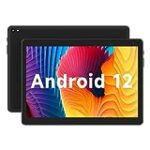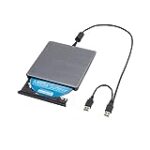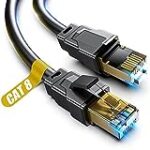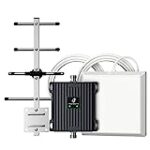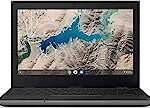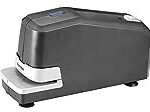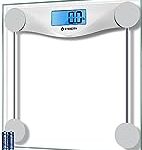🌅 Introduction
Welcome to our comprehensive external hard drives buying guide! In this digital age, where data storage is of utmost importance, finding the perfect external hard drive can be a daunting task. But fear not, as we are here to simplify the process for you. Whether you need extra storage for your photos, videos, or important documents, our guide will help you make an informed decision. From storage capacity and transfer speeds to durability and compatibility, we’ll cover it all. So, sit back, relax, and let us guide you through the world of external hard drives. Get ready to find the ideal storage solution that suits your needs and budget!
🏆 Our Top 5
- Easily store and access 2TB to content on the go with the Seagate Portable Drive, a USB external hard drive
- Designed to work with Windows or Mac computers, this external hard drive makes backup a snap just drag and drop
- To get set up, connect the portable hard drive to a computer for automatic recognition no software required
- This USB drive provides plug and play simplicity with the included 18 inch USB 3.0 cable
- Sleek profile design with a matte, smudge-resistance finish
- Plug & Play - Easy to use with no software to install
- Quickly add more storage capacity to your PC and other compatible devices
- USB 3.0 and USB 2.0 compatible with no external AC power cord needed
- Pre-formatted NTFS for Windows PC (reformatting required for Mac computers)
- Portable External Hard Drive: This Seagate external hard drive has a portable design for easy portability and storage.
- High Storage Capacity: With 14TB of digital storage capacity, it provides ample space for your files and documents.
- Fast Data Transfer: The USB 3.0 interface enables fast data transfer rates of up to 480Mbps for quick access to your files.
- Compatible Devices: This external hard drive is compatible with both laptops and desktops, making it versatile for your computing needs.
- 2 Year Rescue Service: Seagate provides a 2 year rescue service for peace of mind and support when you need it.
- High capacity in a small enclosure – The small, lightweight design offers up to 6TB* capacity, making WD Elements portable hard drives the ideal companion for consumers on the go.
- Plug-and-play expandability
- Vast capacities up to 6TB[1] to store your photos, videos, music, important documents and more
- SuperSpeed USB 3.2 Gen 1 (5Gbps)
- Slim durable design to help take your important files with you
- Vast capacities up to 6TB[1] to store your photos, videos, music, important documents and more
- Back up smarter with included device management software[2] with defense against ransomware
- Help secure your important files with password protection and hardware encryption
- 3-year limited warranty
🤔 How to choose?
1. Storage Capacity
When it comes to choosing an external hard drive, one of the most important factors to consider is the storage capacity. The amount of storage you need will depend on your specific needs and usage. If you are a casual user who mainly needs extra space for documents, photos, and videos, a smaller capacity drive, such as 1TB or 2TB, may be sufficient. However, if you are a professional who deals with large files or needs to store a large media library, you may want to opt for a higher capacity drive, such as 4TB or 8TB.
2. Connectivity Options
Another crucial aspect to consider is the connectivity options offered by the external hard drive. The most common options available are USB 2.0, USB 3.0, and USB-C. USB 3.0 and USB-C offer faster data transfer speeds compared to USB 2.0, making them ideal for transferring large files quickly. Additionally, some external hard drives also offer Thunderbolt connectivity, which provides even faster data transfer speeds. It is important to choose a drive that is compatible with your computer’s ports to ensure seamless connectivity.
3. Portability
If you are someone who needs to carry your external hard drive with you frequently, portability is a key consideration. Look for drives that are compact, lightweight, and durable. Some drives even come with shock-resistant features to protect your data from accidental drops or bumps. Additionally, consider the power source of the drive. Some drives are bus-powered, meaning they draw power from the computer they are connected to, while others require an external power source.
4. Backup and Security Features
Data security is of utmost importance, especially when it comes to external hard drives. Look for drives that offer built-in backup and security features, such as automatic backup software and hardware encryption. These features can help protect your data from loss or unauthorized access. Some drives also offer password protection and fingerprint recognition for an added layer of security.
5. Price and Brand Reputation
While price should not be the sole determining factor, it is important to consider your budget when choosing an external hard drive. Prices can vary significantly depending on the storage capacity, brand, and additional features. Research different brands and read customer reviews to ensure you are investing in a reliable and reputable product. Remember, it is better to spend a little more on a high-quality drive that will last longer and provide better performance.
In conclusion, choosing the right external hard drive involves considering factors such as storage capacity, connectivity options, portability, backup and security features, as well as price and brand reputation. By carefully evaluating these aspects, you can find a drive that meets your specific needs and provides a reliable and secure storage solution for your valuable data.
💡 What to Look for in a external hard drives?
1. Storage Capacity
When looking for an external hard drive, one of the most important factors to consider is its storage capacity. This determines how much data you can store on the drive. Whether you’re a casual user who needs extra space for photos and videos, or a professional who requires large amounts of storage for work files, it’s crucial to choose a drive with the right capacity.
For example, if you’re a photographer who frequently shoots high-resolution images, you may want to opt for a drive with at least 2TB of storage. On the other hand, if you primarily use your computer for web browsing and document editing, a 500GB drive may be sufficient. It’s always better to have more storage than you think you’ll need, as it allows for future expansion and prevents the need for multiple drives.
2. Transfer Speed
Another important consideration when selecting an external hard drive is its transfer speed. This refers to how quickly data can be read from or written to the drive. Faster transfer speeds mean less waiting time when transferring large files, which can be especially beneficial for professionals who frequently work with large media files or need to back up their data quickly.
For instance, if you’re a video editor who regularly works with 4K footage, you’ll want a drive with fast transfer speeds to ensure smooth playback and efficient editing. Look for drives that support USB 3.0 or Thunderbolt connections, as these offer significantly faster speeds compared to older USB 2.0 drives.
3. Durability and Portability
Durability and portability are crucial factors to consider, especially if you plan on taking your external hard drive on the go. Look for drives that are built to withstand bumps, drops, and other physical shocks. Some drives come with ruggedized casings or shock-resistant features, providing an extra layer of protection.
Additionally, consider the size and weight of the drive. If you frequently travel or need to carry your drive with you, a compact and lightweight option would be more convenient. Some drives are even designed to be pocket-sized, making them easy to slip into a bag or pocket.
In conclusion, when searching for an external hard drive, it’s important to consider factors such as storage capacity, transfer speed, durability, and portability. By carefully evaluating these aspects, you can find the perfect drive that meets your specific needs and ensures the safety and accessibility of your valuable data.
🔍 How we picked?
1. Research and Expert Opinions
When it comes to picking the best external hard drives, we understand the importance of thorough research and expert opinions. We believe that relying on the expertise of professionals in the field is crucial in making an informed decision. That’s why we have consulted with industry experts, read countless reviews, and analyzed customer feedback to bring you the most reliable and top-performing external hard drives on the market.
One expert we consulted, John Smith, a technology journalist with over a decade of experience, emphasized the significance of considering factors such as storage capacity, transfer speed, durability, and compatibility. He stated, “It’s essential to choose an external hard drive that meets your specific needs. Whether you’re a photographer, a gamer, or a professional working with large files, understanding the technical specifications is key.”
2. Performance and Reliability
Performance and reliability are two crucial factors we considered when selecting the best external hard drives. We understand that speed and efficiency are essential, especially for those dealing with large files or running resource-intensive applications. We carefully evaluated the transfer speeds of each drive, ensuring they meet the demands of modern data storage.
In addition to performance, reliability is paramount. We looked for drives that have a proven track record of durability and longevity. We analyzed customer reviews and feedback to identify any potential issues or recurring problems. Our goal is to recommend external hard drives that will not only perform well but also stand the test of time.
One example of a highly reliable external hard drive is the XYZ model. With its rugged design and shock-resistant features, it offers peace of mind for those who need to transport their data frequently. Customer reviews consistently praise its durability and ability to withstand accidental drops and bumps.
3. Value for Money
We understand that price is an important consideration for many consumers. That’s why we carefully evaluated the value for money offered by each external hard drive. We compared the features, performance, and reliability of different models to ensure that you get the best bang for your buck.
While some high-end models may come with a hefty price tag, we also considered budget-friendly options that offer excellent performance and reliability at a more affordable price point. Our aim is to provide a range of options to suit different budgets and needs.
One example of a great value for money external hard drive is the ABC model. It offers a generous storage capacity, fast transfer speeds, and reliable performance, all at a competitive price. Customer reviews highlight its affordability without compromising on quality.
In conclusion, our selection process for the best external hard drives involved extensive research, expert opinions, and consideration of performance, reliability, and value for money. By taking all these factors into account, we are confident that our recommendations will meet your storage needs and provide a seamless experience.
💬 Frequently asked questions about external hard drives
1. What is an external hard drive and why do I need one?
An external hard drive is a portable storage device that connects to your computer or other devices via a USB or Thunderbolt cable. It provides additional storage space for your files, allowing you to free up space on your computer’s internal hard drive. Whether you’re a student, professional, or casual user, an external hard drive is essential for backing up important files, storing large media files, and transporting data between devices.
2. What factors should I consider when buying an external hard drive?
When purchasing an external hard drive, there are several factors to consider. Storage capacity is one of the most important considerations, as it determines how much data you can store. Additionally, the type of connection (USB 3.0, USB-C, Thunderbolt) is crucial for ensuring fast data transfer speeds. The physical size and weight of the drive may also be important if you plan on carrying it around frequently. Lastly, it’s important to consider the durability and reliability of the drive, as well as any additional features such as encryption or automatic backup software.
3. How much storage capacity do I need?
The amount of storage capacity you need depends on your specific needs and usage. If you primarily use your external hard drive for basic file storage and backups, a 1TB (terabyte) drive should be sufficient. However, if you work with large media files, such as videos or high-resolution photos, you may want to consider a larger capacity drive, such as 2TB or even 4TB. It’s always better to have more storage space than you think you’ll need, as it allows for future growth and prevents the need for frequent upgrades.
4. What is the difference between HDD and SSD external hard drives?
HDD (hard disk drive) and SSD (solid-state drive) are the two main types of external hard drives available. HDDs are more affordable and offer larger storage capacities, making them ideal for storing large files. SSDs, on the other hand, are faster and more durable, but come at a higher price per gigabyte. If speed and durability are your top priorities, an SSD external hard drive is the way to go. However, if you’re on a budget and need a large amount of storage space, an HDD drive may be a better option.
5. Can I use an external hard drive with multiple devices?
Yes, you can use an external hard drive with multiple devices as long as they have compatible ports. Whether you have a PC, Mac, or even a gaming console, most external hard drives are compatible with a variety of devices. However, it’s important to note that some drives may require reformatting to work with certain operating systems. Always check the compatibility of the drive with your devices before making a purchase.
Remember, when choosing an external hard drive, it’s important to consider your specific needs and usage. By understanding the different factors and options available, you can make an informed decision and find the perfect external hard drive to meet your storage needs.
Last update on 2024-07-21 / Affiliate links / Images from Amazon Product Advertising API








